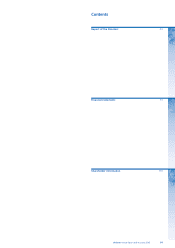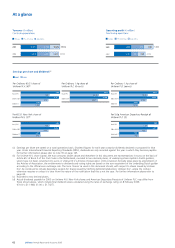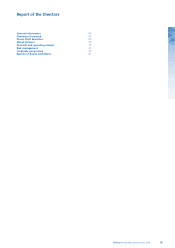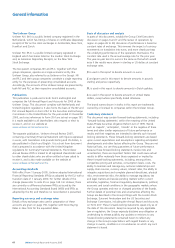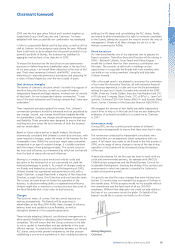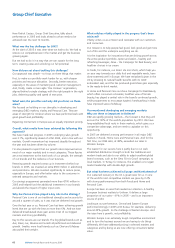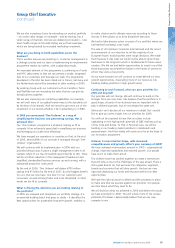Unilever 2005 Annual Report Download - page 14
Download and view the complete annual report
Please find page 14 of the 2005 Unilever annual report below. You can navigate through the pages in the report by either clicking on the pages listed below, or by using the keyword search tool below to find specific information within the annual report.
Report of the Directors
Unilever Annual Report and Accounts 2005 11
About Unilever
(continued)
As ‘One Unilever’ we can now take a holistic view of our global
marketing capability and manage and deploy our talent more
strategically. Overseen by the new post of Chief Marketing Officer
we have developed Group-wide programmes to improve our
skills, tools and career paths, with an unprecedented focus on
brand building and development to support our new structure.
Via our Marketing Academy we have also adopted a more
applied, business-led approach to training, underpinned by
common toolsets and data.
Unilever's mission is to add vitality to life. That includes
encouraging greater vitality among our staff in a programme that
encompassed the broad concepts of ‘fitness of body’ and ‘fitness
of heart, mind and spirit’. Designed to help them manage their
personal energy and resilience in the face of change, as well as
striking a good work-life balance, among other objectives, the
first step of the programme was an Enjoy Nutrition campaign.
This provided staff with important nutritional information, such
as advice on how to reduce consumption of sugar, salt and
unhealthy fats. We also piloted nutritional training for our chefs
and external suppliers so that our canteens and restaurants could
offer healthier options.
In today's global markets, Unilever's international heritage helps
us compete. Our deep roots in over 100 countries worldwide give
us a powerful competitive advantage, enabling us to adapt our
global brands to local consumers’ needs. To help us understand
their needs more fully we’ve introduced a diversity programme so
that our staff reflect our consumers’ diversity more closely in
gender, ethnicity and many other ways.
Diversity is already very evident. For example, our top 1 000
managers span 45 nationalities. With new initiatives, including
local Diversity Boards and toolkits, we hope to encourage diversity
deeper into our organisation.
In Unilever, by embracing our differences, we create an
environment that inspires people to contribute to our business.
We encourage people to be themselves within a framework of
shared values and goals. This means giving full and fair
consideration to all applicants and continuing development to all
employees, regardless of gender, nationality, race, creed, disability,
style or sexuality.
Unilever’s success depends on the economic health of the
countries in which it operates. In an extensive research project
with Oxfam GB and Novib (Oxfam Netherlands) ‘Exploring the
links between business and poverty reduction: A case study on
Indonesia’, we examined the impact our local business has on the
country’s economic well-being. Unilever Indonesia employs about
5 000 direct employees and contract workers. The research found
that indirectly this manufacturing activity supports around
300 000 full-time equivalent jobs in our ‘value chain’ – the chain
that stretches from raw materials suppliers through
manufacturing to distribution and retailing to consumers. Such
employment and the wealth that it spreads around can make a
significant contribution to reducing poverty.
Environment and corporate responsibility
We seek to manage and grow our business around the world in a
responsible and sustainable fashion. The values and standards by
which we expect to be judged are set out in our Code of Business
Principles.
We aim to share these standards and values with our suppliers
and contractors through our Business Partner Code which, in
turn, is based on our Code of Business Principles. It sets out
standards on ten key points of business integrity, labour
standards, consumer safety and the environment.
The long-term success of our business is intimately linked with the
vitality of the environment and the communities in which we
operate. More than two-thirds of our raw materials come from
agriculture, while water and other natural resources play an
equally critical role in our business. To ensure we protect these
key resources, we have clear, long-term eco-efficiency objectives
and targets for our manufacturing operations, as well as three
sustainability initiatives on water, agriculture and fish. Over the
last ten years, we have continued to improve our eco-efficiency
performance across all of our seven key environmental parameters
which we use to measure the emissions from our factories and set
future reduction targets. In 2004 (the latest year for which figures
are available) we continued to improve on our 2003 performance
but did not meet all our targets.
The strength of our commitment to sustainability is reflected in
the fact that we remain the leading food company in the Dow
Jones Sustainability World Index.
In 2005 we spent around €79 million on our voluntary initiatives
in communities around the world. This increase on our 2004
contribution of €65 million is partly due to the overwhelming
response of our business to the plight of the December 2004
Asian tsunami victims.
Our Close Up toothpaste brand launched Project Smile to bring
much-needed oral health care products and advice to people in
rural Nigeria where only around 60% of the population use
toothpaste. The campaign involved retailers of all sizes, including
the very smallest, as partners. We created branded kiosks – tiny
shops – to promote Close Up, and these gave an opportunity to
unemployed young people to make a living by creating new long-
term outlets, as well as offering existing retailers a way to
showcase their wares. The success of the campaign meant it was
quickly extended into towns and cities and over the year sales
rose by 35%.
With its global supply chain, Unilever has a major role to play in
caring for the environment. We believe that acting responsibly
creates advantages for our business, as well as helping to address
environmental concerns. For example, ensuring a sustainable
supply of raw materials, such as palm oil, is essential for the long-
term wealth of our business. Of course, due to the scale and
complexity of this issue, we cannot do this alone. A multi-
stakeholder approach is required, which is why we co-founded
the Roundtable on Sustainable Palm Oil (RSPO) in 2004.


